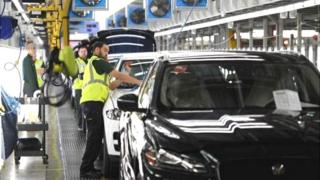UK car production slumps to lowest level since 1954
 Image copyright Getty Images
Image copyright Getty Images The number of cars built in the UK over the past six months has slumped to the lowest since 1954, according to the industry’s trade body.
A total of 381,357 cars were made the six months to June, down 42% on the period last year, said the Society of Motor Manufacturers and Traders (SMMT).
The coronavirus lockdown led to widespread closures and job losses.
But the SMMT warned more jobs were at stake amid fears of a «double whammy» with the addition of Brexit tariffs.
The trade body estimated that 11,349 jobs were lost in the past six months at carmakers and companies which supply them with parts and services.
Britain’s major carmakers all suspended production earlier in the year in response to the lockdown, including Jaguar Land Rover, Honda and Nissan.
Car production fell by 48% in June compared to the same month a year ago, with 56,594 units made, as social distancing measures and weak demand across global markets continued to restrict output.
In June, manufacturing for car sales in the UK market was down by 63%, while exports were 45% lower.
Mike Hawes, SMMT chief executive, said: «These figures are yet more grim reading for the industry and its workforce, and reveal the difficulties all automotive businesses face as they try to restart while tackling sectoral challenges like no other.
«Recovery is difficult for all companies, but automotive is unique in facing immense technological shifts, business uncertainty and a fundamental change to trading conditions while dealing with coronavirus.»
UK car output was forecast to hit two million in 2020, but deteriorating market conditions compounded by coronavirus are likely to cut that number by more than half, Mr Hawes said.
The SMMT called for urgency in talks to secure an EU trade deal, saying most car firms felt a lack of clarity was «severely hampering» preparations for the end of the transition period.
Mr Hawes said the long term future of the motor industry now depended on securing a good trade deal, pointing out that the EU remained the biggest market for UK cars.
He said the industry was facing a «plethora» of issues, with the heavy investment needed to make vehicles more environmentally-friendly adding to the uncertainties of Brexit and the recovery from Covid-19. Sales in September will be crucial in determining the future of the industry, he added.
Analysis by the SMMT, published alongside Thursday’s output figures, suggests that without a positive trade agreement with the EU, and the industry falling back to trade on World Trade Organisation terms with 10% tariffs, annual output could stay around 800,000 to 2025.
The report added that significant questions remained about the nature of trading conditions from January, with uncertainty about customs procedures, regulation and damaging tariffs causing «real concern.»



